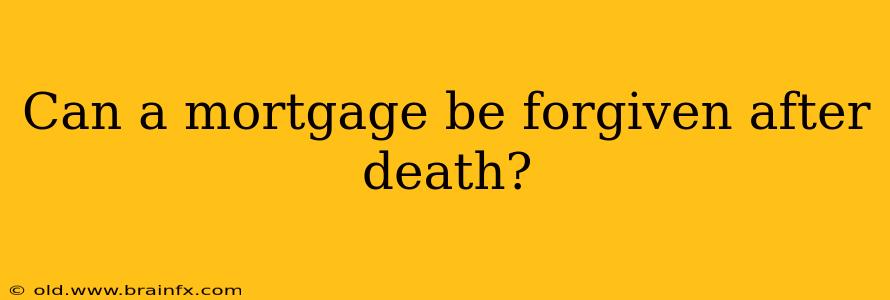The question of whether a mortgage is forgiven after death is a complex one, with the answer depending largely on several factors. While the simple answer is "no," the situation is nuanced and requires a careful examination of the specifics of the mortgage and the deceased's estate. Let's break down the possibilities.
What Happens to a Mortgage After Someone Dies?
When a homeowner passes away, their mortgage doesn't simply vanish. The property and the associated mortgage debt become part of their estate. How the mortgage is handled depends on several key elements:
1. The Type of Ownership:
-
Joint Ownership: If the mortgage was held jointly with a surviving spouse or other co-borrower, the surviving owner typically assumes responsibility for the remaining mortgage payments. The loan continues as is, unless the surviving owner decides to refinance or sell the property.
-
Sole Ownership: If the deceased was the sole owner, the mortgage becomes a debt of the estate. The executor or administrator of the estate is responsible for managing the debt. This may involve selling the property to settle the debt or using other estate assets to pay it off.
2. The Estate's Assets:
The ability to pay off the mortgage after death hinges heavily on the value of the deceased's assets. If the estate's assets (including the property's value) exceed its liabilities (including the mortgage), the mortgage will likely be paid off as part of the estate settlement. However, if the estate is insolvent (liabilities outweigh assets), the mortgage may not be fully paid. This could lead to the property being sold to satisfy the mortgage debt.
3. The Mortgage Terms:
The specific terms of the mortgage agreement play a crucial role. Some mortgages might have clauses related to death or disability, but these are rare. Most standard mortgages do not include forgiveness clauses.
4. Life Insurance:
Life insurance policies can play a significant role in settling outstanding debts, including mortgages. If the deceased had a life insurance policy with a sufficient death benefit, that money could be used to pay off the outstanding mortgage balance, relieving the estate of that responsibility.
Scenarios and Outcomes:
Here are some potential scenarios and their likely outcomes:
- Scenario 1: Joint Ownership, Ample Assets: The surviving spouse inherits the property and continues making mortgage payments.
- Scenario 2: Sole Ownership, Ample Assets: The estate uses assets to pay off the mortgage. The property may then be sold, or inherited by beneficiaries.
- Scenario 3: Sole Ownership, Insufficient Assets: The property will likely be sold to pay off the mortgage. Any remaining proceeds, after paying the mortgage and other estate debts, go to the heirs.
- Scenario 4: Sole Ownership, Life Insurance Coverage: The death benefit from the life insurance policy pays off the mortgage, preventing the need for estate sale or other measures.
Mythbusting: Mortgage Forgiveness
It's important to dispel the myth of automatic mortgage forgiveness upon death. Mortgages are legally binding contracts, and unless explicitly stated in the contract itself or through external factors like life insurance, there's no automatic cancellation of the debt.
Seeking Professional Advice
Navigating the complexities of estate settlement after a death involving a mortgage requires professional guidance. Consulting with an estate attorney and a financial advisor is highly recommended to understand your specific rights and obligations. They can help you determine the best course of action based on the unique circumstances of the situation. Proper legal and financial planning before death can significantly ease the burden on survivors during this difficult time.

